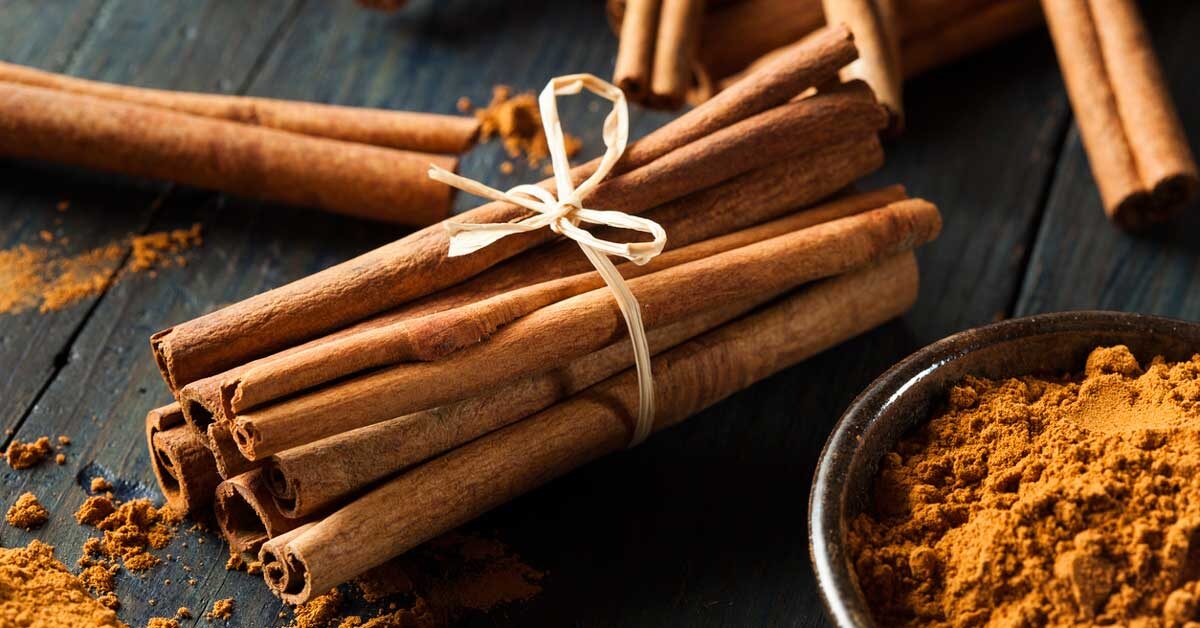Cinnamon is a favourite household spice, and has been used around the world for centuries. Once traded as currency, this spice has a pleasant flavour and warm smell that has made it popular in cooking, particularly in baking and curries.
The spice comes from the inner bark of a small evergreen tree. The bark is peeled and laid in the sun to dry, where it curls up into rolls known as cinnamon sticks. Cinnamon is also available in powdered form.
Discover our full range of health benefit guides and check out some of our delicious cinnamon recipes, from cinnamon buns to cinnamon tea.
Here are 6 health benefits of cinnamon

1. It has anti-viral, anti-bacterial and anti-fungal properties
Cinnamon is thought to have many medicinal and soothing properties, and is used frequently in Chinese herbal medicine. The distinctive smell and flavour of cinnamon comes from the essential oils contained in the bark, called cinnamaldehyde. Cinnamaldehyde displays anti-viral, anti-bacterial and anti-fungal properties.
2. Contains antioxidants with anti-inflammatory effects
Cinnamon also contains large amounts of polyphenol antioxidants. Antioxidants can help protect the body from disease and are found in fruits, vegetables, herbs and spices. The antioxidants in cinnamon have been found to have anti-inflammatory effects.
3. Its prebiotic properties may improve gut health
Some spices, including cinnamon, have prebiotic properties that promote the growth of beneficial bacteria and help suppress the growth of pathogenic bacteria. Therefore, including spices regularly in your diet may help improve gut health.
Cinnamon is also a useful source of manganese and contains small amounts of calcium and fibre.
4. Reduces blood pressure
There is some evidence to suggest that the consumption of cinnamon is associated with a short-term reduction in blood pressure. Although the evidence is hopeful, it would be premature to recommend cinnamon for blood pressure control until a comprehensive randomised controlled trial (RCT) involving a larger number of patients has been carried out. More recent studies have, to date, shown less promising findings.
5. Lowers blood sugar and risk of type 2 diabetes
It has been suggested that cinnamon can have a moderate effect in improving glycaemic control and supporting the management of type 2 diabetes. However, conclusions are mixed, and larger randomised controlled trials are needed in well-defined population groups using standardised interventions in order to definitively determine the efficacy of using cinnamon in subjects with diabetes. However, a small amount used at breakfast or in baking will not do any harm, and can be eaten as part of a balanced diet.
6. Relieves digestive discomfort
Cinnamon extract has been used to alleviate gastrointestinal problems in both Eastern and Western medicine for years. It has been described as a carminative, renowned for its digestive, anti-microbial and anti-inflammatory properties. In traditional Ayurvedic medicine, cinnamon bark oil is used for treating flatulence and digestive imbalance. It is believed that the warmth of cinnamon increases blood flow and improves blood oxygen levels to help fight off illness. To alleviate digestive symptoms, cinnamon is taken as part of a hot drink (much like a tea). In this instance, it’s easier to use ground cinnamon rather than trying to grate cinnamon sticks yourself.
Types of cinnamon
- Cinnamon thrives in tropical regions, where the main variety is Ceylon cinnamon from the Cinnamomum Zeylanicum plant, which comes from Sri Lanka.
- The other main type is Cassia cinnamon, which has a stronger taste and is slightly cheaper.
- To maximise the medicinal value and health benefits of cinnamon, regardless of type, the key thing is its freshness.
- Some prefer the sweet, subtle flavour of Ceylon cinnamon in desserts and the stronger potency of Cassia in savoury dishes, but most commercial cinnamon is a mixture of the two.
How to store and use cinnamon
Cinnamon needs to be kept in an airtight container in a dark place. Whole cinnamon lasts for about a year, but cinnamon that has been ground will start to lose flavour after a few months. It’s worth going through your cupboards to check the use-by dates on cinnamon, as the fresher it is, the better.
Healthy recipes with cinnamon
This article was updated on 13th September 2019 by Kerry Torrens.
Kerry Torrens BSc. (Hons) PgCert MBANT is a Registered Nutritionist with a post graduate diploma in Personalised Nutrition & Nutritional Therapy. She is a member of the British Association for Nutrition and Lifestyle Medicine (BANT) and a member of the Guild of Food Writers. Over the last 15 years she has been a contributing author to a number of nutritional and cookery publications including BBC Good Food.
Jo Lewin is a registered nutritionist (RNutr) with the Association for Nutrition with a specialism in public health. Follow her on Twitter @nutri_jo.
All health content on bbcgoodfood.com is provided for general information only, and should not be treated as a substitute for the medical advice of your own doctor or any other health care professional. If you have any concerns about your general health, you should contact your local health care provider. See our website terms and conditions for more information.


Leave a Reply